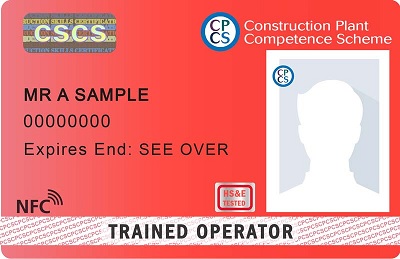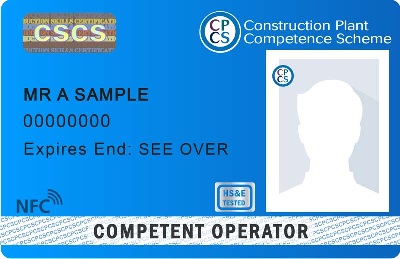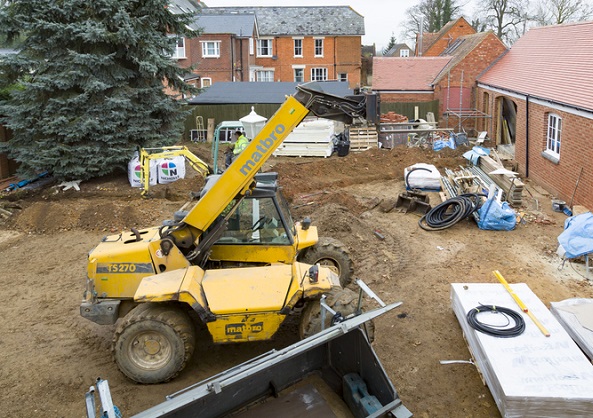What is CPCS? What You Need To Know
Reading time: 6 minutes
Since launching in 2003, the scheme issues CPCS cards for over 64 plant categories, or related specialisms. CPCS qualification is the UK industry-recognised accreditation for workers, to ensure proficiency and safe working practices.
The difference between CPCS and CSCS
CPCS (the Construction Plant Competence Scheme) is a card scheme which demonstrates the skills and competence level of plant and heavy machinery operators specifically, whereas CSCS (the Construction Skills Certification Scheme) is aimed at other areas of the construction industry - such as labourers, handymen, skilled construction workers, managers and architects.
Both schemes show that a worker holds the correct qualifications and training for their role. They help to ensure the health and safety of workers, as well as inspire confidence within the industry that certain training levels and quality standards have been met.
A CPCS training qualification combines both practical skills, as well as theory, and typically takes between one and six days to complete. There are a wide variety of courses available, tailored to specific skills, from Rough Terrain Forklift operation to Telescopic Handler. A CSCS qualification however is gained through proof of your previous training or qualifications, as well as passing the CITB Health, Safety and Environment Test (HS&E test - which also must be passed to gain a CPCS licence).
Types of CPCS cards:
CPCS cards fall into one of three categories, which are the Tester Card, Trained Operator Card and the Competent Operator Card.
1. Black or Grey Tester Card
To gain a CPCS Tester Card you must show your working knowledge of the plant you are operating, and demonstrate how you use it safely in various environments. You’ll also need to prove your health and safety knowledge, first aid skills and plant operating ability.
The Tester Card comes in two variations - the grey card for provisional use (valid for 2 years) and the black card for full Tester qualification (valid for 5 years).
2. Red Trained Operator Card
A CPCS Trained Operator Card is black in colour, and includes a theory test as well as a practical technical test, which must be taken at an officially accredited CPCS test centre. The red card level needs the HS&E Test to be passed within two years of the practical test.

3. Blue Competent Operator Card
The CPCS Competent Operator card is for higher level operators, who can demonstrate their in-depth knowledge, experience and ability using a plant vehicle whilst working without supervision. You’ll also usually need a minimum Level 2 NVQ in your chosen machinery. The practical and theoretical test is also carried out at an accredited test centre. This level of operator may supervise Red Card holders on site.

Previous Competent Operator cards, awarded solely through industry accreditation (IA), are being phased out, and won’t be able to be renewed beyond December 2024. This ensures that all cards are awarded fairly and with the correct professional, independent testing.
How to obtain a CPCS certification
To gain a CPCS qualification, you’ll have to go through each stage to complete the process and be able to apply for your CPCS card:
-
Firstly, decide which card your experience level would best fit - a Tester, Trained Operator or Competent Operator
-
Consider any additional training you may need to gain your CPCS licence (such as an NVQ)
-
Complete the online CITB HS&E Test
-
Within 2 years of passing the HS&E test, apply to take your CPCS Theory Test
-
Take the CPCS Practical Test at an accredited test centre
-
Submit your documentation and await your card
-
It’s recommended to continue your training to later upgrade your card once you’ve gained more skills and experience (if you hold a provisional Tester or Trained Operator card)
-
You can renew your card online before it is due for expiry (except IA blue cards, where you’ll need to complete the appropriate level theory and practical tests)
CPCS cards are issued by the NOCN (National Open College Network).
Regulations for CPCS certification
In order to gain your CPCS card, you’ll need to demonstrate certain practical skills and theoretical knowledge about both plant operation and health and safety. How much experience and knowledge is required depends on which level of card you’re applying for.
Generally though, you’ll need a relevant health and safety qualification (such as a NEBOSH Construction Certificate) and hold a current first aid certificate. You’ll need to pass the HS&E Test, then pass both the theory and the practical test. You may also need specific role-based qualifications, depending on the machinery you operate.
As part of the scheme, the theory and skills test must be taken at an accredited CPCS centre. You can also undertake your training there, but examiners will not usually be your trainers, in order to maintain professionalism.
CPCS and safety standards
CPCS is described as ‘created by the industry, for the industry’ and it aims to give workers the appropriate skills and working knowledge of plant and machinery. This gives employers and site users reassurance that work was carried out safely and using skilled operators.
CPCS training and accreditation adheres to the most up-to-date health and safety requirements for the industry, approved by the Health and Safety Executive, as well as current Codes of Practice, including British Standards (BS EN 17024 – General Requirements for Bodies Operating Certification of Persons) and other sector-led guidance for plant machinery. The theory and practical tests also include sections on personal safety and general construction site safety.
What is CPCS?: FAQs
What is CPCS vs CSCS?
CPCS (the Construction Plant Competence Scheme) is a card scheme which demonstrates the skills and competence level of plant operators specifically, whereas CSCS (the Construction Skills Certification Scheme) is aimed at other areas of the construction industry - such as handymen, skilled construction workers and architects.
Do I need a CSCS card and a CPCS card?
Depending on your role, you wouldn’t usually need both a CPCS and a CSCS card. CPCS is designed for plant operators, whereas CSCS is for general construction workers. However, if you’re multi skilled, you may wish to apply for both, though neither are currently a legal requirement in the UK.
How do I get a CPCS card?
To apply for a CPCS card, you’ll need to gain the relevant qualifications for your card level, pass the HS&E test, take a practical test and pass a theory test before applying. Once you’ve completed these steps you can submit your documentation for accreditation.
Is CPCS better than CSCS?
CPCS training and CSCS qualifications are aimed at different groups of professionals, so one is more likely to suit different career choices. CPCS includes training and assessment aimed at plant and machinery operators, whereas CSCS is aimed more at the construction industry - from labourers to site managers.
Can you go straight to a blue CPCS card?
If you’ve already gained significant experience on site, hold a minimum Level 2 NVQ in your area of expertise and have passed the relevant health, safety, theory and practical tests, it’s possible to go straight to a Blue CPCS Competent Operator card. It is for higher level operators, who can demonstrate their in-depth knowledge, experience and ability using a plant vehicle whilst working without supervision.
So, in summary, the CPCS scheme (Construction Plant Competence), is a training and accreditation programme aimed at plant operators. Like CSCS, it provides proof of health, safety and environment knowledge, but it includes in-depth theory and practical operating knowledge for specific machinery. CPCS cards come in three skill levels, and aim to help promote safety on site, as well as recognise and acknowledge professionally trained and approved operators.
For more articles to help you and your colleagues stay safe on site, visit the Travis Perkins Advice Hub, for information on personal safety, construction safety and risk management, as well as Building Regulations and the different types of construction contracts explained.
Disclaimer: Information displayed in this article is correct at the time of publication, but note that legislation changes periodically. The information contained on this page is intended as an overall introduction and is not intended as advice from a professional building control officer. Travis Perkins aims to avoid, but accepts no liability, in the case that any information stated is out of date.











